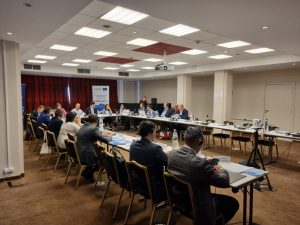
05/08/2022
Strengthening international cooperation, exchanging views and supporting the proper development of drug policy is the objective of the EU-Central Asia Drug Dialogue
Chaired by the Czech Republic, the Brussels event has been attended by the team of the FIIAPP-led European programme for cooperation between the EU and Central Asian countries on drug demand reduction, CADAP 7.
The programme has supported the participation of delegates from Kazakhstan, Kyrgyzstan, Turkmenistan and Uzbekistan in the Dialogue, representing relevant state institutions, whose activities include the fight against drug smuggling and the development of state policy in the field of drugs.

The European Union has been represented by Member States and representatives of institutions and agencies such as the European Commission, the European Monitoring Centre for Drugs and Drug Addiction, EUROPOL, the European External Action Service and the General Secretariat of the Council of Europe. On this occasion, the European Commission presented the EU Drugs Strategy 2021-2025 and its Action Plan 2021-2025.
Expert dialogues on drugs with international partners are a key part of the EU Drugs Strategy 2021-2025, which strongly supports the exchange of information on strategies, objectives and different initiatives.
In this line, CADAP 7, in coordination with the Brussels office of the FIIAPP, organised a briefing and an open technical dialogue on the cooperation programmes on drugs and crime co-led by the FIIAPP. A space in which experiences were shared and partnerships and synergies were established between the EU-funded programmes and the different regions of Central Asia that participated.
The session was opened by the Secretary General of the FIIAPP, Inma Zamora, who stressed:
“Cooperation makes it possible to exchange experiences, bring positions closer together and create links to face common challenges”.
In addition, the event was attended by a representative of DG INTPA, Titien Amati, who highlighted the commitment that the European Union shows with CADAP 7 to fight against drug trafficking and organised crime in Central Asia.

Among others, delegates from Central Asia, representatives of EU Member States’ missions and the Spanish National Plan on Drugs were also present.
The head of the FIIAPP’s Security, Peace and Development Unit, Miguel de Domingo, highlighted the importance of:
“Placing economic crime at the top of the agenda: identification, recovery and management of the proceeds and assets of crime, through the opening of financial investigations”.
For her part, the technical manager of the COPOLAD III Programme in Brussels, Mercedes Alonso, pointed out that
“The economic impact of the crisis is likely to make members of our communities more vulnerable to both drug problems and participation in the drug market, so we need to strengthen public policies“.
CADAP 7 Director Ernest Robelló closed the dialogue by underlining EU-CA relations:
“The EU builds a strong and modern partnership with Central Asia by investing in regional cooperation and partnering for resilience and prosperity”.



